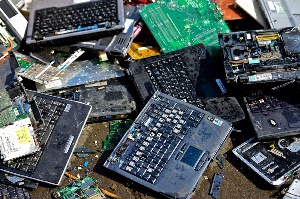 E-waste is generally defined as electronics that have outlived their use
E-waste is generally defined as electronics that have outlived their use
Realizing the Sustainable Development Goals (SDGs) hinges on a digitally connected world. As the world transitioned into a global village, the knowledge economy has also emerged with more dependence on electrical and electronic equipment or e-products.
Demand for some e-products has risen hugely particularly in this COVID-19 era where people are encouraged to stay and work from home. In contrast, the lifespan of most of these e-products has shortened, thus resulting in their being discarded even before reaching their useful lifespan. Have you thought of where all these e-products would be dumped or disposed of after they have become obsolete? E-waste is a major problem that must be given serious attention.
E-waste is generally defined as electronics that have outlived their use or have exceeded their shelf life. They are what the original purchaser has no desire of keeping any longer, thus amounting to waste.
The presence of elements like lead, mercury and arsenic beyond threshold quantities in e-waste classifies them as hazardous waste. As a developing country, we depend on e-products from developed countries to participate in the knowledge economy.
However, the failure to manage obsolete and unrepairable e-products has resulted in e-waste, to the detriment of environmental and human health. Agbogbloshie or Old Fadama in Accra, which is synonymous with the dumping of e-waste, is still a vibrant place where most e-waste is dumped. Other unregulated scrap yards within Tema and Ashaiman metropolis have all contributed to this menace.
A common trend I have observed is how individuals in the communities have resorted to “midnight” burning of household waste which further compounds the problem. The burning of such e-waste in the open, with the fumes being released into the atmosphere and with some of the waste sinking into the soil, has severe human and environmental health consequences.
Communities near unregulated e-waste recycling sites are prone to risk from inhalation of toxic chemicals and exposure to radiation. One of the significant challenges to e-waste management in Ghana is the laxity in the enforcement of the law. The Hazardous and Electronic Waste Control and Management Act, 2016 (Act 917) is a well-crafted act which if enforced can result in efficient e-waste management.
The Way Forward
Local representatives of international corporate organizations dealing in e-business (including Hisense, LG, Samsung, Sony, Tecno, etc) must all be involved in solving this problem. In jurisdictions like Switzerland and Sweden, citizens are encouraged to return overused e-products in return for cash which helps reduce e-waste in the system.
Also, manufacturers of e-products are not left off the hook; when they flout e-waste management laws, punishment is meted out to them. We can learn from the experiences of developed countries by adopting processes that provide “informal” take-back systems or “exchange-old-for-new”.
Pragmatic policies must be directed at the informal recycling sector to harness the skills of the young men in this sector. These young men can still go from household to household and collect e-waste but instead of recycling themselves, they can send it to formal or recognized recycling centers for a fee. This is one way to reduce improper handling and divert more e-waste flows into the formal recycling sector.
The Environmental Protection Agency (EPA) must take up the task of compiling data of all e-products importing and assembling companies. Availability of accurate information is needed to help policy-makers understand the roles of the various players within the e-waste management structure and the material flows between and among them. Such data or information may also help policy-makers to develop collection channels, recycling facilities, and all other aspects of e-waste management.
I was pleased when the issue of e-waste management was highlighted at the vetting of the Minister-designate for Environment, Science, Technology, and Innovation. The minister when given the nod, should take the threat of e-waste seriously and back it up with policies for effective management.
An effective e-waste management system needs a well-established infrastructure for management, separation, storage, collection, transportation, and disposal of waste. These facilities must be dotted all over the country.
So far as we continue to purchase e-products, we must also ensure that we have an efficient system of disposing them when their lifespan is over. The key is to stop the importation of end-of-use e-products (second hand e-products). Ghana must not be a dumping site for e-waste.